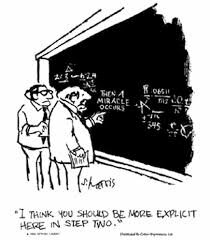Tyger
Paranormal Adept
Again, this is a very romantic, anthropocentric worldview. I don't know that it's wrong, but I do know that it's just one worldview among many.
Romantic? You've lost me there.

Based on this worldview, you must believe that the human capacity for free will was bestowed upon us by an other, correct?
No - plus I don't see that one leads to the other even if I did. You are constructing something here. Not sure I must believe anything.
Because if free will is a capacity that has evolved,
Novel idea - that never occurred to me.
than it would be bold to say that other animals do not have this capacity. (In cognitive psychology worldview, this is known as Executive Functioning.)
I don't think it is bold - it makes sense. Animals do not display free will as we define it - they behave according to what we have hypothesized is instinct. That works for me.
I don't disagree with you that humans are unique among the others animals. However, I think they are unique in degree, not quality.
To some extent that is true, I would agree, if just comparing us as animals. A human, however, that has initiated higher thinking, is significantly different from an animal. Something 'new under the sun.'
I also disagree with you that our uniqueness was bestowed on us by an other in a mystical fashion.
Well, I never said that, so......
Yes, the other matter is scale.
Destruction wrought by humankind is far beyond scale - though scale is certainly part of it. It's the sheer creativity of our destructiveness. Animals can be relied upon to fight in particular ways under certain conditions - and usually in limited ways. Humans fight each other, both to the death and into slavery and torture. There is no question, the human is unique among the animals.
It's not just native peoples, it's religious/mystic peoples in general. As I've said elsewhere, the ideas of karma, Original Sin, etc. are all bedfellows. Our Executive Functioning allows us to inhibit our impulses, to delay gratification.
Wherever you've said it I didn't read it so I know not of what you speak here. Looks like you've got quite a snarl there of various concepts, though.
I'm cursing myself because I just deleted an essay about why people have consciousness at all. It was the same old, same old (social interaction) so I didn't bother posting it here. However, the author did mention something that I've believed for a long time, but had never seen in writing: If consciousness can be defined as being aware that one is aware, then many mystical/religious practices - such as meditation and mindfullness - are an effort to shed, if momentarily, this awareness; rather than being aware of our awareness, we strive to just be.
Would be interested in that essay - but as you mention about there being many world views, so there are many spiritual practices with various goals. No easy way to lump them all together. Would make it easier if one could - like you say all those "religious/mystic peoples in general" - the blanket term that makes it into a 'them' scenario. Fact is - IMO - everyone is religious and mystical - one has only to argue science with a materialistic, atheistic scientist to be aware that religious-like thought and mystical-like articulations are universal tendencies.
His point was this "altered" state is more akin to the animal state; that is, a state of being in which we lose our self-awareness. The ego/self dissolves and we merge with reality. I'll continue to search for the essay.
The writer must have serious insights if he can equate what another person experiences (without experiencing them himself) with the condition of an animal he as well has not experienced. This is part of our problem - dialog proceeds in the abstract, rather than grounded in perception and experience. "The ego/self dissolves and we merge with reality" sounds like what those 'mystical sorts' are up to, I suppose. I would offer that if one is referencing the Freudian ego, okay - lots of dissolving and rebuilding going on there - but Ego as in the Monad or Incarnating Individuality - not so much. You experience your Ego in full awareness you will not be the same person after that. Guaranteed.
I suppose we could boil it down to two world views:
Ah, the eternal dialectic. Yes/No, Black/White, Good/Evil. You are a Manichean.
1) Humans, and everything else in the universe, are the result of self-organising processes. Thus, we can't say that humanity is evolving towards anything like a perfectly moral uber race, but perhaps we can say they are evolving.
2) Humans are the result of a super being bestowing upon us free will and morality. If humanity can come together just so we can evolve into the super special species we were meant to be and make it to the next, perfect plane of existence.
Why do you subscribe to the latter and I the former? I don't know,
I don't know, either - but mainly because I don't recognize the latter to which I am suppose to subscribe or that you say I am suppose to subscribe.

but it probably has something to do with both nature and nurture.
I would say you have effectively argued with yourself, not with me. There is the shadow of a straw man argument taking place here.
Fascinating story, but I'm not sure how it ties in to the discussion.
Oh well - someone else will get the connection.

Last edited:


